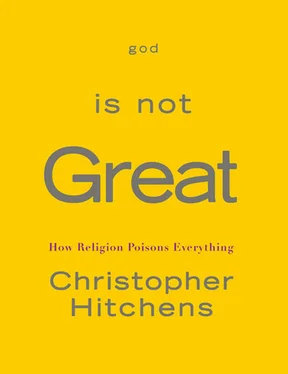Christopher Hitchens - God Is Not Great
Здесь есть возможность читать онлайн «Christopher Hitchens - God Is Not Great» весь текст электронной книги совершенно бесплатно (целиком полную версию без сокращений). В некоторых случаях можно слушать аудио, скачать через торрент в формате fb2 и присутствует краткое содержание. Город: New York, Год выпуска: 2007, ISBN: 2007, Издательство: Twelve Books, Жанр: Публицистика, на английском языке. Описание произведения, (предисловие) а так же отзывы посетителей доступны на портале библиотеки ЛибКат.
- Название:God Is Not Great
- Автор:
- Издательство:Twelve Books
- Жанр:
- Год:2007
- Город:New York
- ISBN:978-0-446-19534-8
- Рейтинг книги:3 / 5. Голосов: 1
-
Избранное:Добавить в избранное
- Отзывы:
-
Ваша оценка:
- 60
- 1
- 2
- 3
- 4
- 5
God Is Not Great: краткое содержание, описание и аннотация
Предлагаем к чтению аннотацию, описание, краткое содержание или предисловие (зависит от того, что написал сам автор книги «God Is Not Great»). Если вы не нашли необходимую информацию о книге — напишите в комментариях, мы постараемся отыскать её.
and Sam Harris’s recent bestseller,
, Christopher Hitchens makes the ultimate case against religion. With a close and erudite reading of the major religious texts, he documents the ways in which religion is a man-made wish, a cause of dangerous sexual repression, and a distortion of our origins in the cosmos. With eloquent clarity, Hitchens frames the argument for a more secular life based on science and reason, in which hell is replaced by the Hubble Telescope’s awesome view of the universe, and Moses and the burning bush give way to the beauty and symmetry of the double helix.
God Is Not Great — читать онлайн бесплатно полную книгу (весь текст) целиком
Ниже представлен текст книги, разбитый по страницам. Система сохранения места последней прочитанной страницы, позволяет с удобством читать онлайн бесплатно книгу «God Is Not Great», без необходимости каждый раз заново искать на чём Вы остановились. Поставьте закладку, и сможете в любой момент перейти на страницу, на которой закончили чтение.
Интервал:
Закладка:
The best argument I know for the highly questionable existence of Jesus is this. His illiterate living disciples left us no record and in any event could not have been “Christians,” since they were never to read those later books in which Christians must affirm belief, and in any case had no idea that anyone would ever found a church on their master’s announcements. (There is scarcely a word in any of the later-assembled Gospels to suggest that Jesus wanted to be the founder of a church, either.)
Notwithstanding all that, the jumbled “Old” Testament prophecies indicate that the Messiah will be born in the city of David, which seems indeed to have been Bethlehem. However, Jesus’s parents were apparently from Nazareth and if they had a child he was most probably delivered in that town. Thus a huge amount of fabrication—concerning Augustus, Herod, and Quirinius—is involved in confecting the census tale and moving the nativity scene to Bethlehem (where, by the way, no “stable” is ever mentioned). But why do this at all, since a much easier fabrication would have had him born in Bethlehem in the first place, without any needless to-do? The very attempts to bend and stretch the story may be inverse proof that someone of later significance was indeed born, so that in retrospect, and to fulfill the prophecies, the evidence had to be massaged to some extent. But then even my attempt to be fair and open-minded in this case is subverted by the Gospel of John, which seems to suggest that Jesus was neither born in Bethlehem nor descended from King David. If the apostles do not know or cannot agree, of what use is my analysis? In any case, if his royal lineage is something to brag and prophesy about, why the insistence elsewhere on apparently lowly birth? Almost all religions from Buddhism to Islam feature either a humble prophet or a prince who comes to identify with the poor, but what is this if not populism? It is hardly a surprise if religions choose to address themselves first to the majority who are poor and bewildered and uneducated.
The contradictions and illiteracies of the New Testament have filled up many books by eminent scholars, and have never been explained by any Christian authority except in the feeblest terms of “metaphor” and “a Christ of faith.” This feebleness derives from the fact that until recently, Christians could simply burn or silence anybody who asked any inconvenient questions. The Gospels are useful, however, in re-demonstrating the same point as their predecessor volumes, which is that religion is man-made. “The law was given by Moses,” says Saint John, “but grace and truth came by Jesus Christ.” Saint Matthew tries for the same effect, basing everything on a verse or two from the prophet Isaiah which told King Ahaz, almost eight centuries before the still unfixed date of the birth of Jesus, that “the Lord shall give you a sign; a virgin will conceive and bear a son.” This encouraged Ahaz to believe that he would be given victory over his enemies (which in the result, even if you take his story as historical narrative, he was not). The picture is even further altered when we know that the word translated as “virgin,” namely almah , means only “a young woman.” In any case, parthenogenesis is not possible for human mammals, and even if this law were to be relaxed in just one case, it would not prove that the resulting infant had any divine power. Thus, and as usual, religion arouses suspicion by trying to prove too much. By reverse analogy, the Sermon on the Mount replicates Moses on Mount Sinai, and the nondescript disciples stand in for the Jews who followed Moses wherever he went, and thus prophecy is fulfilled for anyone who doesn’t notice or doesn’t care that the story is being “reverse-engineered,” as we might now say. In a short passage of only one Gospel (seized upon by the Jew-baiting Mel Gibson) the rabbis are made to echo god on Sinai and actually to call for the guilt in the blood of Jesus to descend upon all their subsequent generations: a demand that, even if it were to be made, lay well beyond their right, or their power.
But the case of the Virgin Birth is the easiest possible proof that humans were involved in the manufacture of a legend. Jesus makes large claims for his heavenly father but never mentions that his mother is or was a virgin, and is repeatedly very rude and coarse to her when she makes an appearance, as Jewish mothers will, to ask or to see how he is getting on. She herself appears to have no memory of the Archangel Gabriel’s visitation, or of the swarm of angels, both telling her that she is the mother of god. In all accounts, everything that her son does comes to her as a complete surprise, if not a shock. What can he be doing talking to rabbis in the temple? What’s he saying when he curtly reminds her that he’s on his father’s business? One might have expected a stronger maternal memory, especially from someone who had undergone the experience, alone among all women, of discovering herself pregnant without having undergone the notorious preconditions for that happy state. Luke even makes a telling slip at one point, speaking of the “parents of Jesus” when he refers only to Joseph and Mary as they visit the temple for her purification and are hailed by the old man Simeon who pronounces his wonderful Nunc dimittis , which (another of my old chapel favorites) may also be an intended echo of Moses glimpsing the Promised Land only in extreme old age.
Then there is the extraordinary matter of Mary’s large brood. Matthew informs us (13:55–57) that there were four brothers of Jesus, and some sisters also. In the Gospel of James, which is not canonical but not disowned either, we have the account by Jesus’s brother of that same name, who was evidently very active in religious circles at the same period. Arguably, Mary could have “conceived” as a virgo intacta and delivered a baby, which would certainly have made her to that extent less intact. But how did she go on producing children, by the man Joseph who only exists in reported speech, and thus make the holy family so large that “eyewitnesses” kept remarking on it?
In order to resolve this near-unmentionable and near-sexual dilemma, reverse-engineering is again applied, this time much more recently than the frantic early church councils that decided which Gospels were “synoptic” and which were “apocryphal.” It is determined that Mary herself (of whose birth there is absolutely no account in any holy book) must have had a prior “Immaculate Conception” that rendered her essentially stainless. And it is further determined that, since the wage of sin is death and she cannot possibly have sinned, she cannot have died. Hence the dogma of the “Assumption,” which asserts out of thin air that thin air is the medium through which she went to heaven while avoiding the grave. It is of interest to note the dates of these magnificently ingenious edicts. The doctrine of the Immaculate Conception was announced or discovered by Rome in 1852, and the dogma of the Assumption in 1951. To say that something is “man-made” is not always to say that it is stupid. These heroic rescue attempts deserve some credit, even as we watch the leaky original vessel sink without trace. But, “inspired” though the church’s resolution may be, it would insult the deity to claim that such inspiration was in any way divine.
JUST AS THE SCRIPT of the Old Testament is riddled with dreams and with astrology (the sun standing still so that Joshua can complete his massacre at a site that has never been located), so the Christian bible is full of star-predictions (notably the one over Bethlehem) and witch doctors and sorcerers. Many of the sayings and deeds of Jesus are innocuous, most especially the “beatitudes” which express such fanciful wish-thinking about the meek and the peacemakers. But many are unintelligible and show a belief in magic, several are absurd and show a primitive attitude to agriculture (this extends to all mentions of plowing and sowing, and all allusions to mustard or fig trees), and many are on the face of it flat-out immoral. The analogy of humans to lilies, for instance, suggests—along with many other injunctions—that things like thrift, innovation, family life, and so forth are a sheer waste of time. (“Take no thought for the morrow.”) This is why some of the Gospels, synoptic and apocryphal, report people (including his family members) saying at the time that they thought Jesus must be mad. There were also those who noticed that he was often a rather rigid Jewish sectarian: in Matthew 15:21–28 we read of his contempt for a Canaanite woman who implored his aid for an exorcism and was brusquely told that he would not waste his energy on a non-Jew. (His disciples, and the persistence of the woman, eventually persuaded him to unbend, and to cast out the non-devil.) In my opinion, an idiosyncratic story like this is another oblique reason for thinking that some such personality may at some time have lived. There were many deranged prophets roaming Palestine at the time, but this one reportedly believed himself, at least some of the time, to be god or the son of god. And that has made all the difference. Make just two assumptions: that he believed this and that he also promised his followers that he would reveal his kingdom before they came to the end of their own lives, and all but one or two of his gnomic remarks make some kind of sense. This point was never put more frankly than by C. S. Lewis (who has recently reemerged as the most popular Christian apologist) in his Mere Christianity . He happens to be speaking about the claim of Jesus to take sins on himself:
Читать дальшеИнтервал:
Закладка:
Похожие книги на «God Is Not Great»
Представляем Вашему вниманию похожие книги на «God Is Not Great» списком для выбора. Мы отобрали схожую по названию и смыслу литературу в надежде предоставить читателям больше вариантов отыскать новые, интересные, ещё непрочитанные произведения.
Обсуждение, отзывы о книге «God Is Not Great» и просто собственные мнения читателей. Оставьте ваши комментарии, напишите, что Вы думаете о произведении, его смысле или главных героях. Укажите что конкретно понравилось, а что нет, и почему Вы так считаете.












